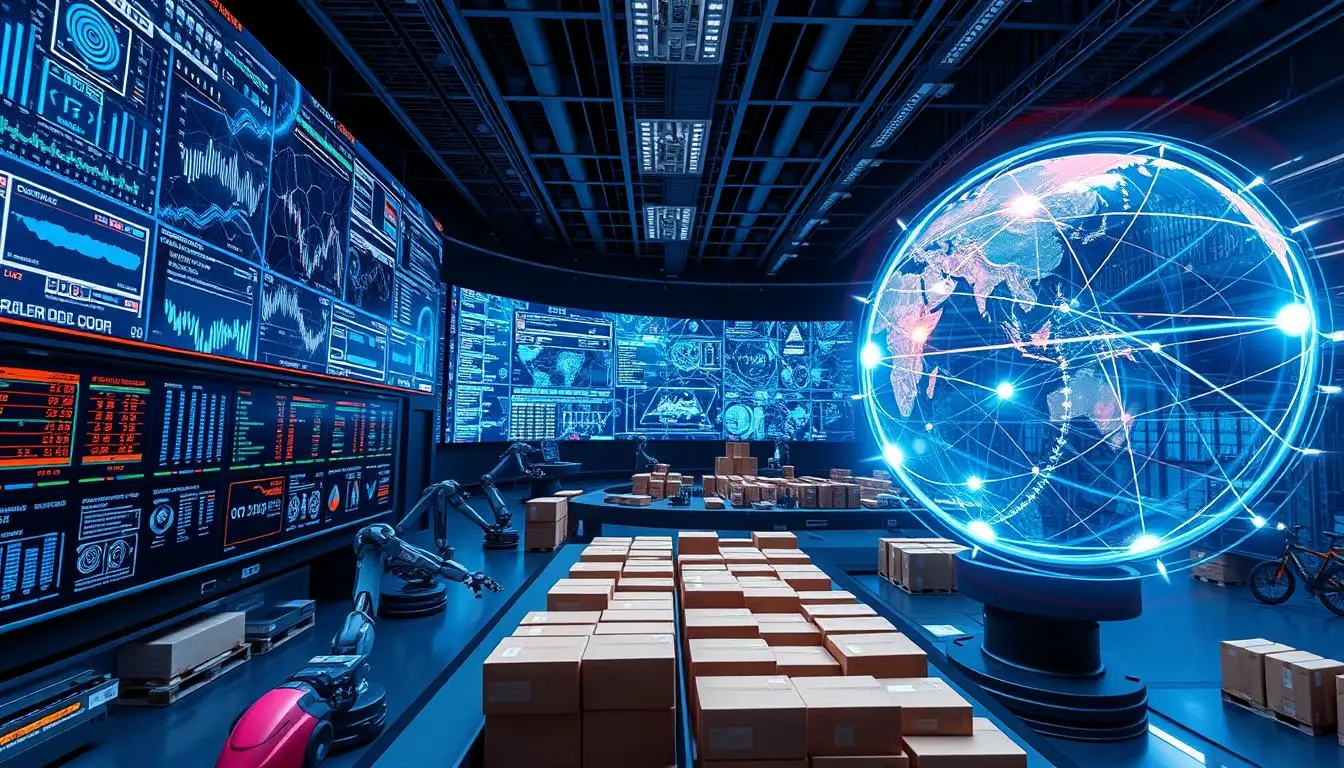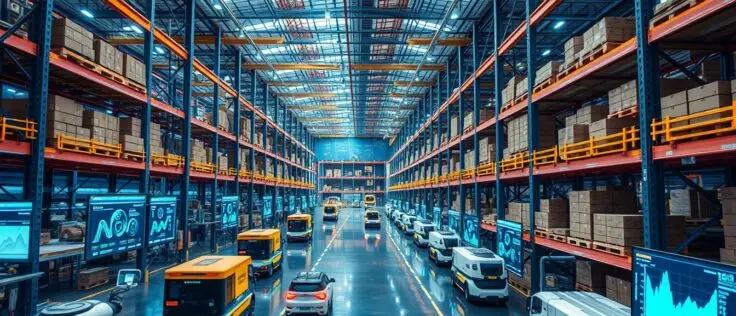The digital makeover of supply chains is boosted by General AI, putting it at the center of efficiency and innovation. With the world’s trade getting more complex, AI in Supply Chain Management is a mix of smart people and smart machines. It pulls useful facts from data, which big companies use to get better at handling their supplies and automating tasks.
Recent findings tell us that GenAI tools are great at sorting and understanding all types of data. This opens doors to better predict demands and manage risks more cleverly in supply chains1. But, there are hurdles like the need for good data and ethical worries. These issues remind us to move towards fully smart supply chains carefully, with strong rules1.
Numbers show a likely increase in robots doing jobs in supply chains in the next five years2. We expect AI to not just make better predictions in supply planning but also to fine-tune how we manage stocks. This meets changing customer needs more accurately12. Big companies and governments are crafting GenAI tools for complex supplier networks. These networks can change plans and where they put resources in no time, showing a big leap forward thanks to AI1.
As we begin to weave GenAI into supply chains, the chance to cut costs and reach unmatched efficiency is on the horizon. The real question is how well companies can use AI’s power. This is key for staying strong, green, and ready for future challenges.
The Emergence of GenAI in Supply Chain Optimization
The arrival of General AI, or GenAI, brings great changes in Supply Chain Management. It introduces big improvements, not just small ones. Over 80% of bosses now see spending on AI in supply chains as key to staying ahead3.
GenAI is changing how things are done. It tackles tough logistical issues better. With GenAI, sorting big data and analyzing deeply is faster. This makes operations quick and much better3.
GenAI Capabilities for Streamlined Operations
Strategic Integration and Innovation in Supply Chains
Using GenAI in supply chains does more than automate tasks. It changes how the whole business works. Companies now use GenAI to connect different parts of their business better. Like one retailer did with GenAI to understand suppliers better and organize contract info3. This helps in making smarter strategic choices, leading to ongoing innovation.
Understanding the Limitations and Risks of AI Implementations
But, using GenAI in supply chains has its issues. Its success relies on good data. Poor data can limit what it can do4. Less human check can also create problems in being clear and ethical4. To overcome these, companies should manage their data well and work with experienced partners to make the most of GenAI.
AI in Supply Chain Management: Enhancing Global Resilience
The use of AI in global supply chains marks a big step towards better resilience. Thanks to Bidenomics, President Biden managed to secure $52.7 billion through the CHIPS and Science Act. This fund is for strengthening supply chains in 20235. The aim is to make supply chains across the US more capable and efficient.
With this large government fund, AI is driving big improvements in supply chains. Companies that have started using AI technologies have seen costs drop by 15%. They also noticed a 35% betterment in inventory levels and a 65% jump in service levels5. These numbers show how much AI can help, with 70% of CEOs recognising its importance in making manufacturing smoother5.
AI tools like Google’s Video AI offer real-time insights to adapt quickly to market changes. The US Department of Transportation used this tech to make a transportation supply chain dashboard during delays5. This example shows AI’s power to improve visibility and speed in global supply chains.
But AI isn’t just about making things run smoother. It also changes how companies plan and manage crises in supply chains. With AI, firms can predict possible issues and come up with strong strategies6. AI also helps them plan for problems with supply and demand, making sure they can handle risks well5.
To see AI’s real effect, look at how it changes inventory management, as seen in Scott Dylan’s blog. AI doesn’t just improve current practices. It also opens doors to new ways of doing things in the future for global supply chains6.
AI-Powered Demand Forecasting for Improved Efficiency
As the world’s markets grow and change, advanced demand forecasting becomes key for staying ahead. Artificial Intelligence (AI) is changing how businesses predict and meet market needs with great accuracy.
Maximising Cost Savings through AI-Enhanced Forecasting
Using AI for inventory control also lowers warehouse expenses. This leads to cost savings across the supply chain8.
AI's Impact on Production and Inventory Planning
AI technologies like machine learning and IoT sensors have changed stock management. They allow businesses to track and analyse data in real time9. Thus, companies keep the right amount of stock, aligning production with market needs. This boosts efficiency and reduces waste, lowering operational costs and raising customer satisfaction78
AI-driven demand forecasting is vital for boosting efficiency and cutting costs in today’s supply chains. By tapping into AI’s predictive power, businesses can better manage stock and foresee future trends. This supports ongoing success and growth.
Insights from AI: Transforming Supply Chain Analytics
In today’s fast pace, AI in supply chain analytics is essential. Businesses now use AI to manage big data, boosting visibility and quick responses in the supply chain. This is key for reacting swiftly to changes in market demand10. Companies like Google are using smart algorithms for better supply chain control. These tools help keep an eye on supply and demand changes. They ensure actions are based on the latest data11.
The recent global disruptions highlighted how AI-based tools help in predicting and managing stock. These tools help businesses stay prepared for market shifts and keep supply chains stable, pleasing customers10. AI also makes shipping more efficient, saving time and money in inventory management10.
AI analytics give supply chains many perks, like quick data analysis and deep insights into what customers want. By using these insights, companies can make their supply chains stronger and more flexible. Tools with smart language processing make choices clearer, aligning supply chain actions with current and future market needs11.
AI is changing supply chain management for the better. With tracking and predictive analytics, companies can deal with today’s market challenges. This ensures their supply chain operations are efficient and effective12.
Reinventing Logistics with Artificial Intelligence
Artificial Intelligence (AI) is reshaping how we handle logistics. It introduces smart solutions for daily tasks, boosting transport management and sustainability. This change is aimed at enhancing productivity and reducing the carbon footprint.
AI's Role in Streamlining Transportation Management
AI plays a big part in improving transportation networks. It examines heaps of data to ensure goods are delivered more precisely. This helps avoid delays and makes operations smoother. AI improves how we manage stock and use storage space, crucial for keeping supply chains efficient13. IoT devices provide essential information in real-time. This makes warehouses faster and more adaptable13.
Reducing Carbon Footprint through AI in Logistics
AI is key in making logistics greener. It has smart routing and forecasting that cut down on unnecessary travel and fuel use. Giants like Walmart and Carrefour have embraced AI. They’ve seen big improvements in service and stock efficiency, which also lessens their carbon footprint14. Robots add to productivity and save more energy13.
Constant use of AI gives companies a strategic edge. It guides them to be more eco-friendly, efficient, and innovative in managing transportation.
Procurement Revolution: AI's Influence on Supplier Relationships
The rapid evolution of artificial intelligence has changed procurement greatly. It’s reshaping how companies deal with suppliers. By using AI to automate processes, companies are finding new ways to work more closely with suppliers. This leads to better workflows and costs savings15. It also brings innovative ideas from suppliers to the table.
AI is now key for understanding market trends and how suppliers perform. It helps procurement teams spend smarter and bargain better15. Also, AI allows for quick, informed decisions. This boosts the efficiency of procurement.
AI also solves efficiency problems in working with suppliers. With advanced AI tools, companies communicate better with their networks. This results in a clearer picture of the supply chain. It also improves coordination, vital for adapting to market changes and managing risks15.
Stories from companies like FlyPolar show how AI leads to more engagement and loyalty. This is seen in the use of AI systems similar to Amazon’s16. For more details on how AI boosts sales, check out this article on improving conversion rates with AI.
Finally, AI is making procurement smarter and more resilient. It’s clear that AI doesn’t just improve supplier relationships. It also helps procurement to be more predictive and integrated. This change is pushing procurement into a new era. It is setting new standards in managing supplier relationships.
Cost Reduction Strategies via AI-Driven Automation
Now, businesses worldwide are rushing towards AI-driven automation to boost efficiency and slash costs. By adopting automation tech, companies are seeing their operational costs drop and productivity soar. The aim is to reach supreme operational performance.
Achieving Operational Excellence with AI Solutions
AI technologies like machine learning and natural language processing are transforming supply chain operations. They streamline processes and sharpen decision-making. This leads to smarter resource use and less waste.
Thanks to AI automation, businesses can swiftly adjust to market shifts and consumer needs. This ability keeps them ahead in the fast-paced global arena. AI’s role in supply chain and manufacturing is set to grow greatly by 202517.
Leveraging AI for Enhanced Predictive Maintenance
Predictive maintenance, supercharged by AI, is revolutionizing fields that depend on heavy equipment. AI can foresee equipment failures, cutting down on downtime and saving on maintenance costs.
This forward-thinking method prolongs equipment life and guarantees uninterrupted production, cutting costs notably. AI’s use in this area has improved inventory management by 35%, showcasing its power to lower costs and boost efficiency17.
AI-driven methods have proven they can refine supply chain management and strengthen profits through savings and heightened productivity. As firms tackle today’s market challenges, AI’s role in cost cutting and operational excellence grows ever more crucial. For more insights on enhancing supply chain operations, click here.
The Strategic Role of AI in Supply Chain Planning
In today’s ever-changing market, Strategic AI is key to enhancing Supply Chain Planning. It transforms how we manage inventory and strengthens our defences against future issues.
AI as a Co-Advisor in Supply Chain Scenarios
These AI systems also check product quality thoroughly. They detect flaws swiftly, ensuring products meet high standards consistently18.
Preparing for Future Disruptions with AI-Enabled Planning
This foresight in handling difficulties speeds up important decisions. This makes our supply chains stronger against surprises.

Supply Chain Transparency and Ethical AI Utilisation
Artificial Intelligence (AI) has greatly changed today’s supply chains. It helps companies watch and make every part of their work better. This new level of detail lets them be sure they’re getting stuff from the right places and meeting rules. AI systems suggest the best ways to arrange warehouses and move stock. This means companies have exactly what they need based on what customers want19. Using AI cuts costs by getting rid of waste and avoiding problems1920.
AI also lets companies keep up with high standards by finding and fixing mistakes early1920. It can look at loads of data to find out where goods come from. This makes sure the supply chain is clean and fair19. AI is also good at sorting out important information, which keeps records tidy and makes transporting things smoother19.
But, using AI in supply chains has its tough parts. Getting AI started can cost a lot and shake things up. Training AI on your own data or using complicated AI systems is hard and expensive1920. Still, growing ethical AI practices and new rules are crucial. They show a dedication to being sustainable, well-managed, and innovative in the changing world of supply chains.
FAQ
How is AI transforming supply chain management?
AI is making big changes in how supply chains work. It makes things more efficient and automated. AI uses data to make operations smoother, manage stock better, predict what will be needed, and control transportation well.
What is GenAI and how does it benefit supply chain operations?
GenAI stands for General AI and deals with smart actions. In supply chains, it makes sorting, analysing, and adjusting plans in real-time better. This makes the whole supply process more streamlined and efficient.
What are some limitations and risks associated with AI in supply chains?
AI in supply chains can face data issues, ethical worries, and less human control. To tackle these, good planning, governance, and pairing up with seasoned partners are essential. This makes sure AI is used responsibly.
How does AI contribute to global supply chain resilience?
AI helps global supply chains be more robust. It makes predicting demand better, gives insights for key decisions, and improves supplier network coordination. These help the supply chain stand strong against disruptions.
What role does AI play in demand forecasting?
AI is key in predicting demand by analysing a lot of real-time data. This allows companies to plan production, manage stock, and adjust their distribution to meet demand in a clever way.
Can AI lead to cost reductions in supply chain management?
Indeed, AI cuts costs in managing supply chains by making demand forecasts more accurate, improving how operations run, and foreseeing maintenance. Businesses using AI see lower shipping costs, better stock levels, and improved service.
How does AI enhance supply chain analytics?
AI gives better tools for data analysis, keeping an eye on stock movement and market demand changes. This lets companies react swiftly and keep their supply chains running smoothly.
What is the impact of AI on logistics and transportation management?
AI transforms logistics and transportation by making smarter routes, speeding up deliveries, cutting delays, and supporting green logistics. It helps save on costs and boosts how well organisations work.
How is AI changing procurement and supplier relationships?
AI updates procurement with tools for smoother workflows and better communication with suppliers. Its systems can outline supply networks and better coordinate suppliers, improving procurement and efficiency.
What are the benefits of AI in achieving operational excellence and predictive maintenance?
AI drives operational excellence by backing decisions with data and making processes better. For predictive maintenance, AI predicts maintenance needs, reducing downtime, extending equipment life, and saving money.
How does AI function as a co-advisor in supply chain planning?
As a co-advisor, AI offers scenarios and advice to avoid risks in supply chain planning. It helps businesses plan for disruptions with insights on supply chain complexities and future trends.
In what ways does AI support supply chain transparency and ethical utilisation?
AI boosts supply chain transparency by better tracking and verifying ethical sourcing. By effectively analysing data, companies ensure compliance with standards and their operations meet quality and sustainability goals.
Source Links
- How generative AI in supply chain can drive value – https://www.ey.com/en_gl/insights/supply-chain/how-generative-ai-in-supply-chain-can-drive-value
- Artificial Intelligence (AI) in Supply Chain and Logistics – https://throughput.world/blog/ai-in-supply-chain-and-logistics/
- PDF – https://www.alixpartners.com/media/twvhoyy2/generative-ai-in-supply-chain_2024.pdf
- How generative AI in supply chain can drive value – https://www.ey.com/en_uk/insights/supply-chain/how-generative-ai-in-supply-chain-can-drive-value
- The Role of AI in Developing Resilient Supply Chains | GJIA – https://gjia.georgetown.edu/2024/02/05/the-role-of-ai-in-developing-resilient-supply-chains/
- The Power of AI in Supply Chain Management – https://c3.ai/blog/the-power-of-ai-in-supply-chain-management-for-increased-resilience-and-growth/
- AI for Supply Chain Optimization: Improve Demand Forecasting – https://aimconsulting.com/insights/ai-supply-chain-optimization-demand-forecasting/
- AI-Based Demand Forecasting: Optimizing Supply Chains – https://appinventiv.com/blog/ai-for-demand-forecasting/
- Supply Chain Forecasting with AI – https://throughput.world/blog/supply-chain-forecasting-with-ai-2/
- How AI for Data Analytics Is Transforming Supply Chain – https://surgere.com/blog/ai-for-data-analytics-and-its-impact-on-supply-chain/
- IfM Insights – https://www.ifm.eng.cam.ac.uk/insights/big-data-and-the-new-analytics/the-power-of-ai-for-supply-chain-efficiency/
- The Future is Now: AI and Digital Transformation in the Supply Chain – https://www.linkedin.com/pulse/future-now-ai-digital-transformation-supply-chain-iker-bernús-x4foe
- AI and IoT are Redefining the future of Supply Chains – https://www.logisticsbusiness.com/it-in-logistics/ai-iot/ai-and-iot-are-redefining-the-future-of-supply-chains/
- Artificial Intelligence is reinventing the future of the Supply Chain – https://such-consulting.com/how-artificial-intelligence-is-reinventing-the-future-of-the-supply-chain/
- Harnessing Generative AI: Revolutionizing Procurement Efficiency in 2024 – https://www.ismworld.org/supply-management-news-and-reports/news-publications/inside-supply-management-magazine/blog/2024/2024-03/harnessing-generative-ai/
- Succeeding in the AI supply-chain revolution – https://www.mckinsey.com/industries/metals-and-mining/our-insights/succeeding-in-the-ai-supply-chain-revolution
- The Role of AI in Supply Chain Management in 2024 | SPD Technology – https://spd.tech/artificial-intelligence/artificial-intelligence-in-supply-chain-challenges-and-applications/
- The Center – Revolutionizing Efficiency: The Role of Artificial Intelligence in Supply Chain Management – https://www.the-center.org/Blog/March-2024/Revolutionizing-Efficiency-The-Role-of-Artificial
- Reap the Benefits of AI in Supply Chain – https://www.oracle.com/uk/scm/ai-supply-chain/
- What Is AI in Supply Chain? | IBM – https://www.ibm.com/think/topics/ai-supply-chain






